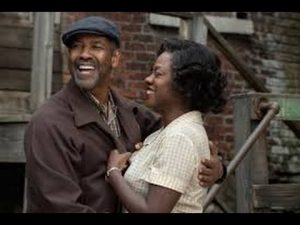Fences
Posted on December 22, 2016 at 5:43 pm

August Wilson’s towering play, the winner of the Tony and Pulitzer prizes, has been magnificently put on screen by director/star Denzel Washington, who won a Tony for the play’s 2012 Broadway revival, and who works with much of that show’s cast in this version.
Wilson’s own screenplay wisely avoids the usual impulse to “open up” a play by adding locations and reducing the dialogue. The best known of Wilson’s ten-play “Pittsburgh cycle,” one for each decade of the 20th century, “Fences” is a story of epic scope and mythic resonance. The gorgeous dialog makes poetry out of the kind of talk we hear around us all day: the jokes, mock insults, and bragging of co-workers and long-time friends, the intimate humor of a longtime couple, anguished confrontation, bitter recollection, back-and-forth that skims the surface while the emotions roil and explode below. To the extent that it preserves the artificiality of a theatrical performance, it emphasizes its ambitious reach. If a play has a character named Gabriel (Mykelti Williamson) who is cognitively impaired following a war injury, who carries a trumpet, and who constantly reminds his brother of a betrayal and survivor guilt, if the tile “Fences” is literal and metaphorical and the character building the fence talks about keeping out the actual angel of death, the audience must recognize these signals of serious, profound, dramatic engagement with eternal themes and be grateful for the chance to be a part of it.
Washington plays Troy, a garbageman who was once a star of a Negro Leagues baseball team but was too old to cross over into the Major Leagues the way Jackie Robinson did. He still keeps a bat and ball in the back yard. He still holds onto the bitterness and dashed dreams of his years as a player. But now, he just wants a promotion to driver, a job only held by white men where he works.
His wife is Rose (Oscar-winner Viola Davis, who also won a Tony for her performance in the revival). We first see Troy bragging to his best friend Bono (Stephen McKinley Henderson) about how he laid down the law when he met Rose, telling her he was not interested in marriage. She laughs indulgently and affectionately, but makes it clear that it was quite the contrary. “I told him if he wasn’t the marrying kind, then move out the way so the marrying kind could find me.”
Troy and Rose have a son in high school, Cory (Jovan Adepo), a talented football player. Rose sees football as a chance for Cory to attend college, and Cory desperately wants to play. But Troy refuses, saying “The white man ain’t gonna let you get nowhere with that football noway.” His mind and spirit have been so constricted by what he has faced that he cannot bring himself to believe that real opportunity exists for Cory. Or perhaps he cannot face the possibility that Cory will do what he could not.
Troy also has an older son, Lyons (Russell Hornsby), with a woman he never married. Lyons, a musician, asks Troy for a loan, mostly as a way to find a way to talk to him, to find a way to see if he means anything to him. Troy tells him he should not need to ask for money, and Lyons responds, “If you wanted to change me, you should’ve been there when I was growing up.”
And Troy worries about his brother Gabriel, who lived with Troy and and Rose in a home they bought with his disability money, but who has moved down the street because he wants more independence. Troy feels guilty for not taking care of him, and for living in a house he would not have been able to afford but for his brother’s disability.
And so, he makes a bad decision that will shatter his family’s foundation. The scene where Davis goes from disbelief to shock to fury will be used for decades in acting class, but she is just as impressive in the movie’s final moments. While Troy occupies much of the screen time and dialogue, it is really Rose who is the heart of the story. Troy can brood, but cannot change. He can hurt, but he cannot heal. He is so damaged that he cannot offer his sons love or respect. But see Rose’s strength. Her resolve is not grounded in compromise or concession. Her soul has expanded to encompass all of life’s contradictions. And it is the great gift of this film that it expands ours, too.
Parents should know that this film includes themes of racism and adultery, some strong language, sexual references, and a sad death.
Family discussion: Do you agree with Rose’s choice? Why didn’t Troy want Cory to play football? What do we learn from Troy’s relationship with Gabriel?
If you like this, try: “A Raisin in the Sun” and “Desire Under the Elms”
